By Corrie Butler, a Canadian Red Cross aid worker who recently travelled to Nepal to document recovery two years after the earthquake. Photos: Marko Kokic/Canadian Red Cross
Ganga is shaping a new future for her community where her children will flourish
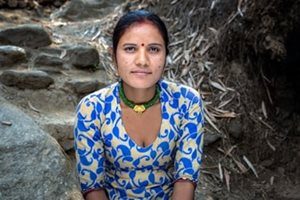
Ganga Chahan looks out proudly onto the valley of her village in Sindhulpalchowk – one of the worst earthquake-affected districts in Nepal. Her bustling neighbours work around large dirt craters and mounds of brick and stone construction, tending to their hill-side vegetable farms and livestock.
Through a first of-its-kind local Red Cross Action Group, designed to engage community members including women, those who are disabled or are in lower caste systems in Nepal, Ganga is helping design and implement programs related to water and sanitation, health and shelter. As a mother of two children, she also supports fellow mothers as a health educator, sharing important information related to HIV prevention and care, child nutrition and vaccinations.
Not only has Ganga’s participation been crucial in her community’s recovery, it has improved the life of her own family as well. Ganga’s husband received training from the Red Cross as a mason, helping to rebuild homes after the earthquake. This has given them essential income they need to support their children’s futures.
“We are now earning more which gives us more independence,” says Ganga with a beaming smile. “We are living better.”
Witnessing Red Cross in her own community, Anuja knew she needed to help
Anuja Koirala won’t forget the moment she experienced the two terrifying tremors that took place between April and May 2015. But what she remembers even more were the moments after the dust from the rubble settled and the din of communities and first responders came through, including Red Cross.
“There was a huge support from the Red Cross that came to my community, and that supported reestablishing the energy in people and bringing hope to people,” recalls Anuja. This inspired her to get involved, joining the Nepal Red Cross as a volunteer.
“As a youth and as somebody who wasn’t as affected as some other people in my community, I thought I should be volunteering,” says Anuja. “I wanted to do be able to do something for the community.”
From the early relief to the long-term recovery, Anuja has seen it all, including the more than 110 Canadians who deployed to Nepal over two years. She now works for the Canadian Red Cross and brings valuable insight into the day-to-day operations, including training staff from the Nepal Red Cross how to set up a field hospital for future disasters. Working with the Red Cross has ignited a passion in Anuja who is now on a career trajectory in disaster relief and response.
“As a community person, pre-earthquake, I only recognized Red Cross as an organization that supported people after a disaster, like a flood, or an organization that runs an ambulance service,” says Anuja. “But after the earthquake and after being part of the Red Cross, I understand the many areas that Red Cross works. My question now is: ‘what does Red Cross not do?’”
Putali Tamang is bringing water to her community’s doorstep
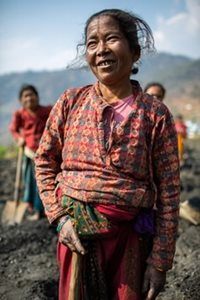
With hardened, sun-weathered hands, Putali Tamang hauls her garden tool into the soil. She stops, wipes the sweat and dust blanketing her brow and looks out proudly on her progress. She has spent hours under the intense, mid-day sun, digging a multi-kilometre trench that leads to her village in central Nepal. It is hard work but she knows it will be worth it. With the help of Red Cross, she knows this trench will bring water to 150 families in her community. This is her legacy.
Nepal’s extreme landscapes present major challenges for accessing clean water. Tamang, like many women in rural areas of Nepal, often risk long, treacherous walks over mountainous terrain, carrying heavy loads to fetch water for her family. The newly installed water system will not only save her two hours each day in fetching a small amount of water, it will improve the situation for her family and community significantly and keep her and her family healthy.
“Red Cross ensures communities own projects like building the water system,” says Nazar Rehman, Norwegian Red Cross Water, Sanitation and Hygiene Delegate. “This has made a real difference. It has allowed us to help communities with what they know they need for the long-term.”
Day or night, Dawa and Yangjen respond to the call
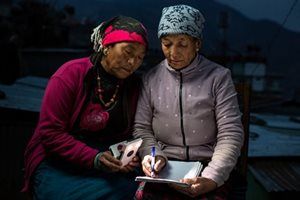
The work never ends for female community health volunteers, Dawa Wangmo Tamang and Yangjen Ghole. For over 23 years, they have committed their time to serve women and children’s health needs in their community.
As part of a government initiative to enhance maternal and newborn health and reduce malnutrition across the country, these voluntary positions are given to women who come from underprivileged and marginalized communities in order reach some of families who are most vulnerable.
“We love being able to help children, women and pregnant mothers in the district,” says Yangjen.
In remote Dhunche, in the District of Rasuwa in Nepal, electricity is hard to come by and where there is access, it is often unreliable. The Red Cross has distributed 1,700 Waka Waka solar powered phone chargers and flashlights to help volunteers like Dawa and Yangjen in earthquake-affected communities respond to calls – day or night.
“With the light, we can safely reach homes where a woman is going into labour late at night and we can help them to the hospital.” says Dawa.
“They are all like my family”
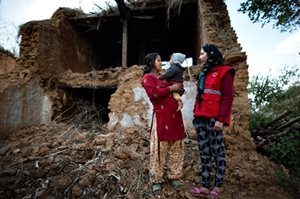
Rojeena Rijal, Social Mobilizer with the Nepal Red Cross walks through the village of Kharelthok, District of Kavrepalanchok in Nepal, barely making it a few meters before stopping to greet and chat with a villager standing outside her home. She clasps her hands together in prayer, bows her head and greets Urmila, a mother with a baby propped on her hip. “Namaste, diddi,” she says, which roughly translates to “hello, older sister”.
Urmila grabs Rojeena’s familiar hand with a beaming grin. She shares a few giggles before welcoming Rojeena into her small one-bedroom, sheet-metal home. It sits in the shade of a half-crumbled building - a reminder of a life Urmilla used to have before the earthquake.
“Many of the people in this community were middle class. But after the earthquake, their state changed,” says Rojeena. “They lost all their property like their livestock, their houses, they lived in temporary tents for two or three months.”
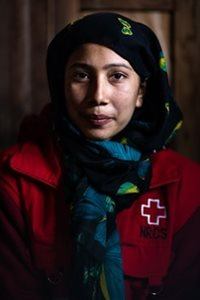
Social Mobilizers, like Rojeena, are crucial to responding to the unique needs of even the most remote and hard-to-reach communities in Nepal. They become a part of the communities they serve by understanding their needs, finding the best way Red Cross can respond and monitoring their progress. Rojeena helps communities access adequate health care and water and sanitation, rebuild their homes and restore their earning capacity.
Urmila is one of the many villagers in this community benefitting from Red Cross efforts, having received training in rearing livestock, she just received her first baby buffalo to help her earn money and produce enough nutrient-rich milk to feed her two young children.
“When I visit in the community, the people think ‘Red Cross is here to support us’ – they are thankful to us,” says Rojeena. “They are all like my family. They love me and I love them.”